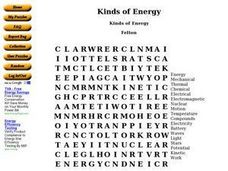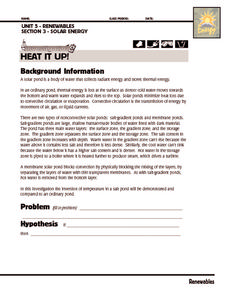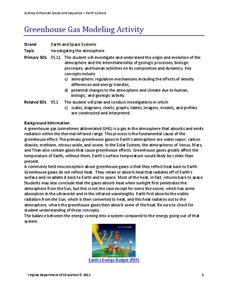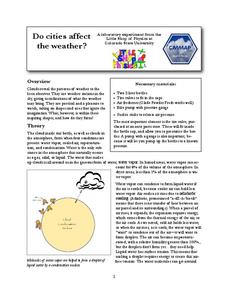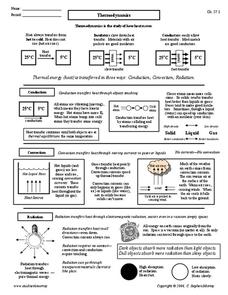Curated OER
"Blow, Wind, Blow" - Wind Power
In this renewable energy activity, learners learn about wind power. They then answer the 2 questions on the activity. The answers are on the last page of the packet.
Curated OER
Solar Energy Word Search
In this word search instructional activity, students single out fifty words related to solar energy. Examples include spectrum, thermal, and focal point.
Curated OER
Kinds of Energy Word Search
In this energy word search puzzle, students identify types of energy and related terms. They identify 18 words from a given list. An answer sheet is provided.
Curated OER
Insulators, Conductors, and Energy Transfer
Third graders conduct experiments to determine what types of material make good insulators. They prepare a graph of time vs. temperature for their sample. They choose a graph using each kind of material to display for class analysis and...
Texas State Energy Conservation Office
Investigation: Heat it Up!
This demonstration of solar ponds can be used in an earth, environmental, or physical science setting. Lab groups set up a solar pond and model how it is able, due to a salt concentration gradient, to maintain heat for future use.
Curated OER
Math in Science-Knowing the Calories You Take In!
I can burn off one scrambled egg in 30 minutes of walking? Explain how we daily consume and burn calories using this fun worksheet, which breaks down basic foods and activities into kilocalorie equivalents. Nutritionists calculate the...
National Museum of Nuclear Science & History
Alphas, Betas and Gammas Oh, My!
Referring to the periodic table of elements, nuclear physics learners determine the resulting elements of alpha and beta decay. Answers are given in atomic notation, showing the atomic symbol, mass, atomic number, and emission particles....
Virginia Department of Education
Greenhouse Gas Modeling Activity
Why are greenhouse gases called greenhouse gases? Young Earth scientists learn about greenhouse gases though experimentation in the second installment of a 3-part series. They use lamps to model radiant energy as well as warming through...
Curated OER
Ocean Power
Students explore the energy resources of the ocean. In this energy lesson, students participate in 4 activities focused on energy resources from the ocean.
Curated OER
Survival Still
Learners explain how to desalinate water using solar energy. For this solar lesson students complete a lab activity and explain capillary water.
Curated OER
Sand or Rock? Finding Out From 1,000 km
Middle schoolers observe how measurements are made with different instruments. In this remote sensing instructional activity students investigate the physical state of surfaces including the surfaces of the solar system.
Columbus City Schools
What’s Up with Matter?
Take a "conservative" approach to planning your next unit on mass and matter! What better way to answer "But where did the gas go?" than with a lab designed to promote good report writing, research skills, and detailed observation. The...
Colorado State University
Why Does it Get Colder on a Clear Night than a Cloudy Night?
Clouds are nature's insulator! A lab investigation asks learners to use an infrared thermometer to measure differences in infrared temperatures. They find that pointing the thermometer at a cloud has a much different result than pointing...
Colorado State University
Do Cities Affect the Weather? (Making a Cloud in a Bottle)
The dynamics of a city can have a drastic effect on the weather. A hands-on lesson asks learners to build a model to illustrate how city pollution provides a nucleus for condensation. The greater the pollution, the greater chance for...
Curated OER
More Thermochemistry Problems
This two-page assignment covers basic thermochemistry concepts. Chemistry learners identify exothermic and endothermic processes, explain a phase change graph, and draw an energy level diagram. There are no problems to solve, just...
Curated OER
What's Cooking
Students complete a solar radiation activity. In this solar radiation lesson, students complete an experiment to learn about solar radiation. Students make solar tea by using the energy of the Sun to brew tea.
National Wildlife Federation
The Tide is High, but I’m Holding On… Using ICESat Data to Investigate Sea Level Rise
Based on the rate of melting observed from 2003-2007 in Greenland, it would take less than 10 minutes to fill the Dallas Cowboys' Stadium. The 17th lesson in a series of 21 has scholars use the ICESat data to understand the ice mass...
Rochester Institute of Technology
Heat Transfer
Use an exciting role play activity to teach young chemists about the importance of heat transfer in maintaining homeostasis. They assume the role of a dog sled owner who has been abandoned and must fend for themselves with only a few...
Curated OER
Thermodynamics
In this thermodynamics worksheet, students learn about insulators and conductors. Students compare the three ways thermal energy is transferred: conduction, convection, and radiation. This worksheet has 22 matching, 1 multiple choice, 3...
Curated OER
Capturing the Sun's Warmth
Students explore the variety of ways to use solar energy. They investigate the thermal energy storage capacities of different test materials to determine which to use in passive solar building design. They explain how passive solar...
Curated OER
Heat Unit
Students define thermal equilibrium. They distinguish between internal energy and heat. Students describe how the quantity of heat that enters or leaves a substance is measured.
Curated OER
IPC Textbook Guided Reading-Chapter 27-Heat
In this heat worksheet, students answer 21 short answer questions about heat transfer through conduction and convection, thermal conduction and conductors.
Discovery Education
Cool It!
Adjust the melting time of ice without varying the temperature! Learners experiment with different materials to decide how the materials affect the rate an ice cube melts. They then connect their findings to the conductivity of each...
Colorado State University
What Is a "Convection Cell"?
Round and round in circles it goes! A hands-on activity has learners recreate a model of a convection cell. They watch as the difference in density of their materials creates a current.
Other popular searches
- Thermal Energy Transfer
- Thermal Energy and Heat
- Thermal Energy Lab
- Thermal Energy Powerpoint
- What Is Thermal Energy
- Transfer of Thermal Energy
- Thermal Energy Worksheets
- Thermal Energy Lessons
- Thermal Energy Florida
- Thermal Energy Crossword
- Thermal Energy Physics
- Temperature and Thermal Energy




